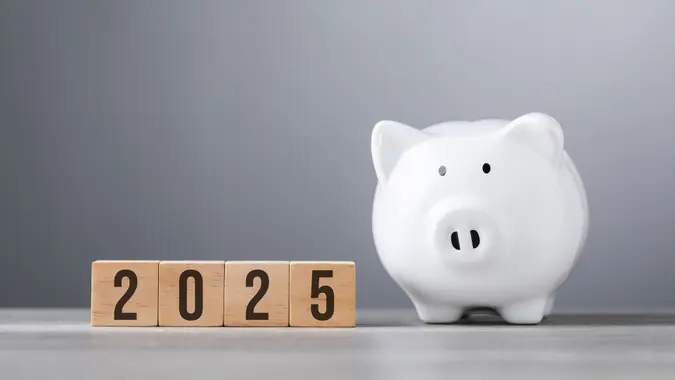6 Budgeting Tips to Implement in 2025 to Further Build Your Savings

Commitment to Our Readers
GOBankingRates' editorial team is committed to bringing you unbiased reviews and information. We use data-driven methodologies to evaluate financial products and services - our reviews and ratings are not influenced by advertisers. You can read more about our editorial guidelines and our products and services review methodology.

20 Years
Helping You Live Richer

Reviewed
by Experts

Trusted by
Millions of Readers
If you’re not planning your budget for 2025, you’re essentially planning for financial stress by the end of 2026.
“There’s no room for guessing when it comes to money management,” said Andrew Gosselin, CPA, personal finance expert and senior contributor at Coupon Mister.
“It’s about setting up systems that work for you and sticking to them, even when it’s not easy.”
Below are experts’ top budgeting tips to implement in 2025 to further build your savings.
Start With Clear Goals
According to Shirley Mueller, finance expert and founder of VA Loans Texas, one of the most effective ways to stick to a budget in 2025 is to set specific and meaningful financial goals upfront.
“Whether you’re aiming to build an emergency fund, save for a down payment, or pay off debt, having a clear purpose for your savings will keep you motivated and disciplined.”
She went on, saying, “From my experience, breaking big goals into smaller milestones like saving $500 a month instead of $6,000 a year, makes the process feel more manageable.”
Mueller also recommended using tools like a budgeting app or a simple spreadsheet to track progress and celebrate small wins along the way to stay engaged.
Participate In Savings Challenges
One approach Gosselin said can kickstart savings is participating in savings challenges.
A no-spend challenge, for example, is surprisingly effective,” he explained.
“Spend only on essentials for a set period — groceries, bills, maybe gas for the car. It’s not about deprivation; it’s about breaking habits and noticing where your money tends to slip through the cracks. You might find that skipping a few takeout meals or delaying a small purchase adds up faster than you thought.”
Meal Plan
Meal planning is another practical way to save without feeling like you’re cutting corners, said Gosselin.
“When you plan your meals and write a grocery list before heading to the store, you’re less likely to toss random things into the cart.”
It also means fewer trips back because you forgot something and less food going bad in the fridge because you bought more than you needed.
“I’ve had clients tell me they didn’t realize how much their grocery bills were padded by impulse buys until they started planning.”
Audit Your Subscriptions
Take a hard look at your subscriptions.
“These are the quiet budget leaks that don’t scream for attention but can drain your account over time,” said Gosselin. “Streaming services, fitness memberships, apps–you’d be surprised how many of these add up.”
Canceling just one or two you barely use can free up cash that goes straight into savings instead of slipping away unnoticed.
Build An Emergency Fund
“Building an emergency fund is one of those steps that feels like a luxury until you actually need it,” Gosselin highlighted.
The key, he explained, is to start small.
“Save enough to cover one month of expenses, and then build from there. Trying to save it all at once can feel overwhelming, but setting aside even a little each month creates momentum.”
He added, “By the time you hit three to six months of coverage, you’ll realize how much peace of mind it brings. It’s not about if something will go wrong–it’s when.”
Stay Informed About Tax Changes
“Ignoring tax laws is a quick way to lose money that could’ve stayed in your pocket,” said Gosselin.
He noted that keeping up with updates means you’ll know what deductions are available or what adjustments might impact you.
“It’s not glamorous, but a little planning can save you a lot of stress — and cash — down the line.”
Bottom Line
Starting small is the best course of action when it comes to budgeting, Gosselin says. But you do have to sit down and make the plan.
“If you don’t build a plan, debt will build itself for you. Financial success isn’t about big, dramatic moves. It’s about the small, consistent decisions that stack up over time. These steps might seem simple, but they work. And the earlier you start, the stronger your savings will be by the time you need them.”
More From GOBankingRates
 Written by
Written by  Edited by
Edited by 

























